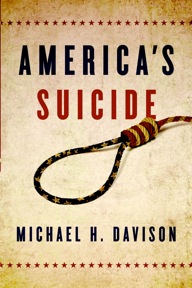America’s Suicide: ‘We are murdering … proud America’

By Maggie Thurber | For Ohio Watchdog
LET’S READ: “America’s Suicide” by Michael H. Davison was published by Dapa Publishing in 2014 and is available in paperback for $14.95.
“America’s Suicide” by Michael H. Davison is billed as “a political diagnosis of the ills causing America’s rapid decline and a philosophically minded remedy” that is sure to spark debate.
“We are murdering industrial America, self-reliant America, entrepreneurial America, confident America, proud America. In its place we erect a welfare state, a nanny state, a parental state, a nation of dependent adults.
“Is this good? It is if that is what we really want and freely vote for it. No non-controversial moral principle forbids us to follow this course. But are we sufficiently aware of the not only economic price that we must inevitably pay?”
But “spark debate” is probably an understatement.
It starts out describing the problem of our growing welfare state. “We are dissipating the hard earned wealth of our grandparents and mortgaging the lives of our grandchildren all to maintain the illusion that we do not have to pay for what we want in the present,” the author writes.
Davison says Americans realize there is something very wrong with the path the nation is on, but suffer under the delusion that the cure can be found by electing the right people.
He identifies both the modern political right and left as statists and merely two different ways to kneel to authority. The only solution, he writes, is to reject both sides.
Libertarians might be the only ones to appreciate that.
Davison spends several chapters spelling out what he calls the inevitable failure of the socialism and collectivism that liberals and progressives promote through a parental government. He eviscerates the argument that such a government is the embodiment of compassion, saying that individual responsibility is the only cure.
The political left won’t like being called children who are expecting a government to be the parent, responsible for feeding, clothing, housing and caring for them.
But capitalism, at least the capitalism practiced in America, isn’t the best alternative, either, he claims.
Capitalism is blamed for just about every social ill on the planet, Davison writes, and while some of the claims about an unfettered capitalistic society intent on profit over people may ring true, the alternatives of socialism or communism or whatever –ism is presented are far worse.
Davison asks the reader to consider the hypocrisy in the criticism of capitalism.
“The aspersions against business appear daily in the press. Why is there not a similarly expressed distrust of manipulative government? It has a far longer and fouler history of deceit and exploitation.”
He says a better capitalistic society would be more like a sporting match, with rules for behavior and referees who can enforce “sportsmanlike conduct.”
Conservatives and those on the right don’t escape critique.
Davison says the political right is dominated by religious dogmas that are quickly becoming irrelevant due to the advances of science. He calls the religious faction “intellectually bankrupt” and says that religious conservatives are collectivists just like socialists.
Sure to spark heated debate is the comparison of a Christian who kills an abortion doctor to the Muslims who kills infidels. The difference he fails to mention is that the Christian faith forbids murder while some radical Muslims say their faith demands the murder of infidels.
The solution, he suggests, is to develop a rational foundation for morality outside of the authority of God or government.
Easier said than done.
Davison also has nothing but derision for Republicans who rail against tax-and-spend liberals but can’t seem to balance a budget or dismantle any government program when they get into power. He refers to the GOP philosophies as “thinly filtered liberal broth garnished with toothpick flags and miniature bibles.”
He offers several solutions, including 14 Principles of The Rational and Responsible American Party ranging from “government fiscal prudence and permanently balanced budgets” to “strict separation of religion and state with no tax privileges or references to God on money” and “no industry or business is too big to fail.”
A key principle is that once reaching adulthood, individuals are entirely responsible for every thought and action and “from that principle there is no escape.” Nothing lets a person off the hook — though they may appeal for help, no one is required to give it.
Davison concludes that if we want a better world, we should start with ourselves and our children, rather than with our political committees. But most parents already do that and look where we are now.
Of special interest were his two charts — one showing a religious concept next to the parallel socialist concept and the other a socialist dictionary identifying the concept, the claimed meaning, the seductive appeal and the real definition, which is less than flattering.
There is a lot to like in this philosophical approach to righting the path of the nation, but those on the left will reject the arguments for why their path is doomed to failure while those on the right will have a hard time considering a moral authority that can replace God. Both sides will see nothing but further rancor, despite the author’s claim to be above it.
Davison’s writing is easy to read and I found myself looking forward to the plethora of colorful metaphors that permeate his writing.
But after such detailed critiques and logical arguments leading one to agree with how bad things really are, readers may be disappointed in the solutions that seem more like platitudes than concrete actions ready for implementation. In fact, the various ideas laid out in the last chapter are more a series of individual thoughts, further separated from each other by double spacing between the paragraphs.
While the book raises plenty of questions for a reflective mind, those most in need of such reflection probably will not be the ones reading it.







